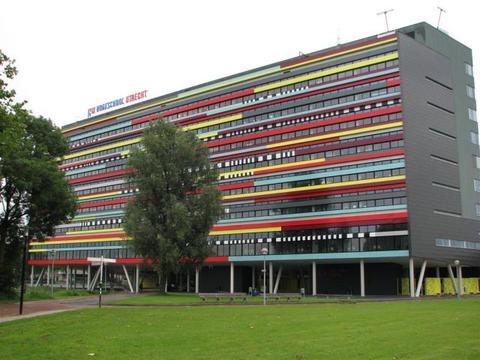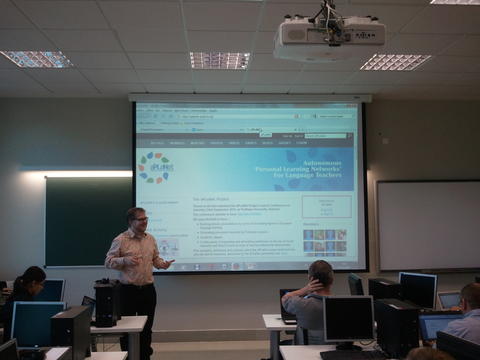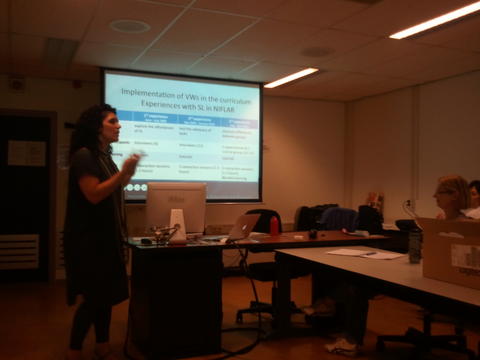PERIODS COVERED: 2019 -2018, 2017 – 2016, 2015 – 2014, 2013 – 2012 (below), 2011
First 5-day IWB course in Comenius Project Tabula Alba
Submitted by tonk on Sat, 11/23/2013 – 12:40
On behalf on TELLConsult, having been invited by the project coordinators of the
Comenius Regio Project Tabula Alba 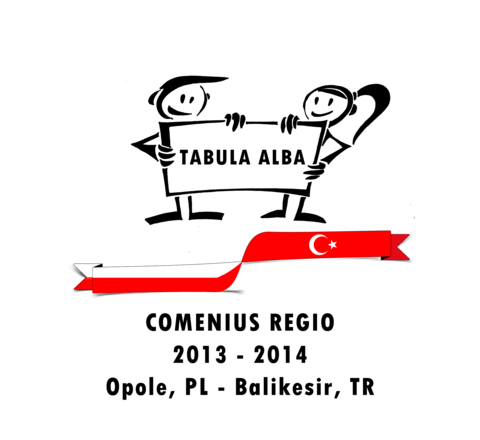 to develop and run the professional development programme on the integration of IWB into classroom teaching, most of my time in November was spent on preparing a first 5-day ‘IWB in Education-workshop’ planned to be run in Opole in Poland.
to develop and run the professional development programme on the integration of IWB into classroom teaching, most of my time in November was spent on preparing a first 5-day ‘IWB in Education-workshop’ planned to be run in Opole in Poland.

As we (the coordinators and myself) did somehow not come round to properly define the specifications for the contents of the programme I suggested to adapt the questionnaire I used for the needs analysis in the EU SmartVET project to collect data from the registered participants (n=16) that would help to at least plan this first session.
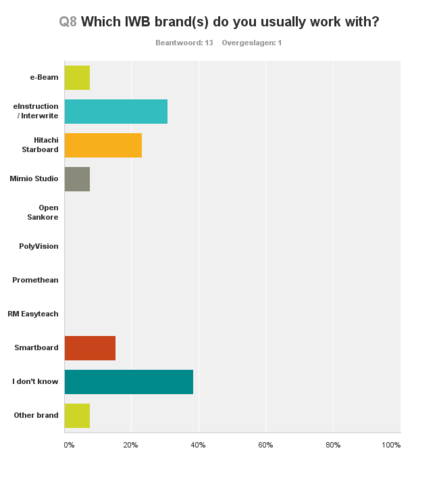
As this intake brought a high level of heterogenity to light in various respects (access to & teaching experience with IWB, brands and number of IWBs available in the workplace, IWB board + software skills , school subjects expertise) we could in time adapt the course design to accomodate this wide variety in needs.

I decided to use a VLE to facilitate the digest of task instructions and exploration of resources in small and -where relevant- subject-oriented groups. Tasks were redesigned so as to better allow execution at various levels of IWB know-how and interest. Also IWB-board specific information and resources were made available.
Then in the course of the first day it became clear that more adaptations were needed as also participants’ roles in education and their EFL levels appeared to vary greatly from grass roots practitioner to school principal and including other roles such as ICT/IWB expert and project coordinator.

To try and meet this challenge we further reduced the number and length of plenary presentations and instructions in English.
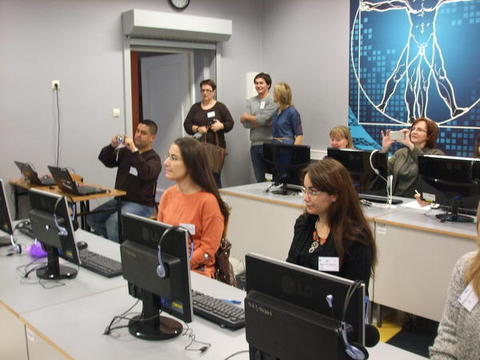
Also two participants were kind enough to provide instant oral translations at plenary moments and produce written language versions of relevant documents, (e.g the online evaluation questionnaire) so they could be digested in pairs or small, language groups, referred to earlier.
Although the evaluation results showed that for most participants the course met their expectations:
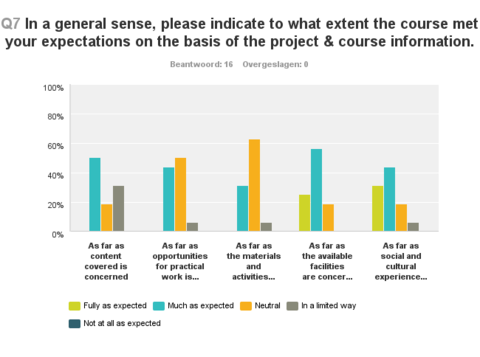
we plan to discuss the implications of our observations below with the coordinators to contribute to the further development of this EU regional project.
Rretrospectively, we conclude that the main challenges, from an instructional point of view, include:
- the differences in culture, attitude and skills related to (independent) learning in teacher professional development activities and active participation in live course activities
- the language issue that reduced, if not prevented, the effectiveness of relevant moments for in-service teacher learning based on presenting task results, discussing resource analysis and sharing peer observations of video registrations of class room teaching and live micro-teaching.
- And, more in general, the ‘lost in translation issue’ affecting many other course activities
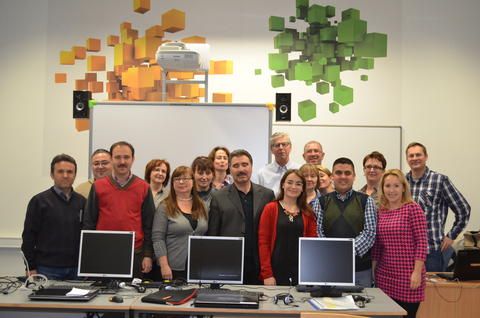
Latest news on Erasmus+ from Dutch EU National Agency
Submitted by tonk on Tue, 10/29/2013 – 21:06
TELLConsult concluded the September / October period by attending an information session on the Erasmus+ programme for principals and managers of institutions of primary, secondary and adult education organised by the NL European Platform organisation.

The information provided was most topical as presenters passed on the latest developments on the Erasmus programme definition gathered on a special session organised by the EU in Brussels for all national agencies and ministries. However, as provider of Comenius courses many questions I had could not be answered yet. E.g. on the continuation of the course validation procedure (customary in Netherlands) and alternatives for the current Comenius-Grundtvig Training In-Service Training database (which will be discontinued), only to name a few.
Most of my other activities in this period were related to dissemanination of results of EU projects TELLConsult is involved in e.g.:
- At the annual conference of the national Association of Dutch Language teachers in Utrecht, the Netherlands we actively disseminated project information and flyers about the SmartVET and Euroversity projects. Key multipliers at the NL national teacher educators SIG (OPLET) and the coordinator of the national Modern Languages expertise centre at the University of Leiden were given iTILT’s memory stick with model IWB content files.
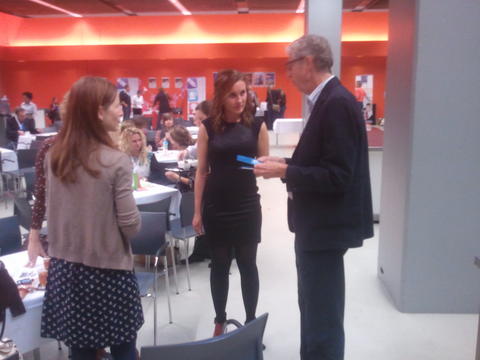
At the final conference of the EU project SmartVET on IWBs in vocational education in Ireland we presented the training needs analysis research report that TELLConsult was responsible for. To involve the audience we asked them questions and had them make predictions about specific survey results. For this we used the beta update of the Socrative website . Slighly less that half of the delegates present participated. Their answers to the question how big a percentage of their colleagues did not use the interactive whiteboard at the start of the SmartVET project (80% on average!) shows that the project certainly is well timed and obviously serves a need.
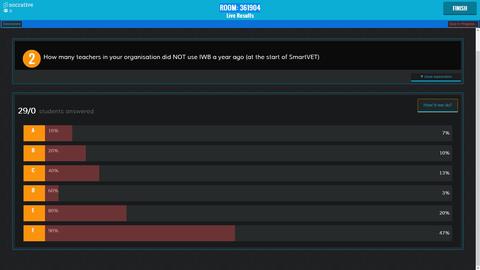
- We made three contributions to the EuroCALL 2013 conference in Evora, Portugal:
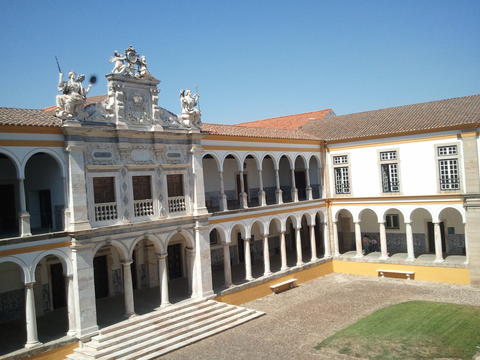
We presented a paper on EU experts’ views on the future of Language Education. And we teamed up with projectpartners to do a workshop on behalf of the Euroversity network and present the results of the iTILT and SmartVET projects in the EU projects strand.
Overview September events
Submitted by tonk on Sun, 09/29/2013 – 23:59
iTILT project evaluated
The final report on the iTILT project on IWBs in language education has received a 9 out of 10 score, for which the Executive Agency responsible for Lifelong Learning Projects has congratulated the whole team on this “excellent achievement”. The evaluators rated the multilingual websi te www.itilt.eu “of very good quality” for its combination of “several important and well-resourced functions: as a resource for materials with immediate application in classroom setting, awareness raising components with practical tips and suggestion for use and a teaching (tutorial) component”.
The evaluators also singled out iTILT’s evaluation processes and quality assurance methods, stating that: “As a whole the project applied rigorous procedures for ensuring the usability and the quality of all project products.” The range of dissemination activities is another iTILT strength, including social media, national and international conference participation, the iTILT Comenius course, the variety of published articles, and the website itself, which the evaluators cited as “well applied for dissemination purposes”.
Find more info on the iTILT-research results here: http://www.itilt.eu/node/719
Annual EuroCALL Conference
Attached the paper that also summarises the SmartVET project presented at the EUROCALL conference (see blogpost: http://etuitionnetwork.ning.com/profiles/blogs/smartvet-presented-at-eurocall-conference).
Am sending it as another piece of evidence of my dissem activities. Also it could be added to the deliverables with the final report, as an additional result.
Preparing for final conference of the SmartVET conference
At the final dissemination conference of the SmartVET project on IWBs in vocational education I
Just uploaded Needs Analysis Research Report http://www.scribd.com/doc/172850843/Needs-Analysis-Research-Report-SmartVETproject … via @Scribd #iwb #SmartVET #digibord #tbi #pdi #edtech #vet #mbo
A ‘road-tested’ model for training teachers/tutors in the use of IWBs – indeed a model for implementing other technologies as they come on stream.
A web-based resource to support the building of capacity in the effective use of IWBs and an online Community of Practice to facilitate teachers sharing best practice and collaborating around such use.
Training Programmes, Learning Manuals and CPD materials on the effective use of IWBs to enhance teaching and learning.
A needs analysis of teachers regarding the training they feel they need to become competent in the use of IWBs
Attendance @ upcoming EUMED meeting conflicts with presentation commitments @ #SmartVET final conference http://www.etbi.ie/ #iwb #mbo
http://ivea.ie/resources/smart_vet.shtml
July: hectic but exciting month for TELLConsult
Submitted by tonk on Fri, 08/02/2013 – 23:42
TELLConsult’s time and effort was spent on a broad range of activities in July. On the very first day of the month we joined the group of delegates of the Comenius course ‘Pedagogical Use of Interactive Whiteboards’ and its course director Diana Barrister at European Schoolnet HQ in Brussels.
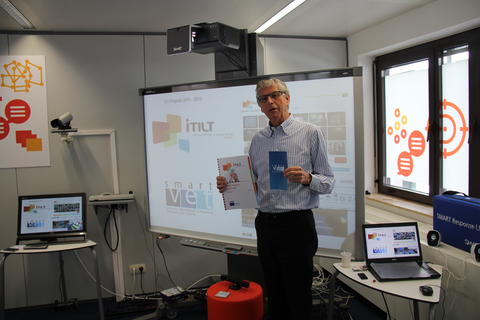
Invited by the coordinator of the EU project CPDLab to contribute to this course we presented on subject specific approaches to IWB use.
Most of our content was related to the iTILT project on IWBs in Language Education. However we also had the opportunity to share info on (interim) results of the related EU project SmartVET and distribute its newly published project brochure.
The next week was spent on finalising 2 papers for inclusion in the Proceedings of the EUROCALL 2013 Conference to be published later this year.
At the conference in Portugal in September 2 presentations have been planned, entitled “iTILT and SMARTVET: 2 EU projects to promote effective interactive whiteboard use in Language and Vocational Education” and “Expert views on how language education may develop in the next 20 years and what CALL could contribute”.
We intend to work on extended versions of these short papers (current versions restricted to 1500 words) and will make them available when finished.
Then it was high time to do the final preparations for the iTILT 5-day Comenius summercourse. One of the activities involved was the creation of a course room using the Schoology Learning Management System (LMS), I got to know about at the course ‘Pedagogical Use of
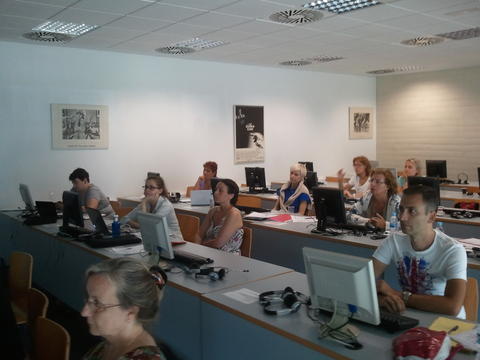
Interactive Whiteboards’ mentioned before. The more since we regrettably had to cancel the Aveiro session in Portugual we were very pleased we could run the Valencia edition thanks to some last-minute registrations. Find more information on the contents and evaluation results in this blogpost.
While working on post-course activities including admin stuff, analysis of evaluation data, blog writing etc very good news reached us about our participation in the submittance of the EU project proposal CAMELOT. Dr Michael Thomas (University of Central Lancashire), the intended coordinator of the project, mailed us to say that ‘We heard today that we have been successful with the CAMELOT project KA3 bid!!’
CAMELOT stands for ‘CreAting Machinima Empowers Live Online language Teaching and learning’ and is due to start in December 2013. More information about the project’s objectives and TELLConsult’s role in this blogopost.
Heike Philip, co-initator of the proposal, had a chance to already present about the project at the Virtual World Best Practice in Education (WBPE) online conference VWBPE.org: see her blogpost with a link to the recording of her presentation here.
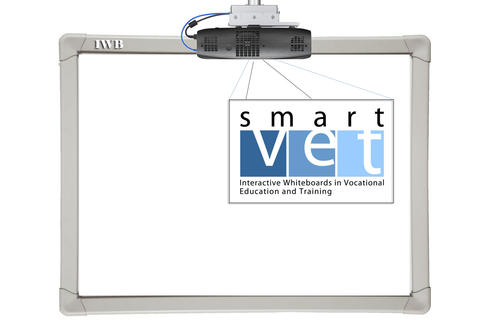
So after the finalisation of the admin work involved for CAMELOT (e.g. Mandate letters), it looks like the preparations for our first contribution (a 5-day workshop) to the Polish and Turkish Comenius regio project ‘TABULA ALBA’ and the translation work for the SmarVET project (video clips, training programme and training manual) will also keep us occupied during part of August.
Schoology course room created for iTILT 2013 Comenius course
Submitted by tonk, on Fri, 07/12/2013 – 09:43
We just finished creating a course room for the iTILT Comenius course using the Schoology Learning Management System (LMS). I first got to know this learning environment at the 2013 Comenius course ‘Pedagogical Use of Interactive Whiteboards’ offered by the EU project CPDLab.

Invited by the coordinator to contribute I had the pleasure of working with course director Diana Barrister and the group of delegates on Tuesday July 2 and presented on subject specific approaches to IWB use.
Hence most of our content was related to the iTILT project on IWBs in Language Education. However we had the opportunity to also share info on (interim) results of the Leonardo project SMARTVET and distribute the newly published project brochure.
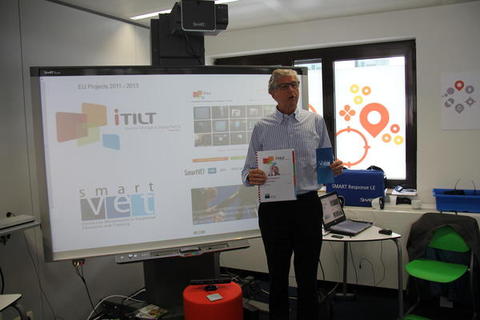
iTILT project ended: impressive impact figures!
Submitted by tonk, on Fri, 06/28/2013 – 22:22
The iTILT project finished this weekend and the final report was duly delivered to the EU commission. Just a few data from the final report to show how successful the results are on the disseminateion front (also testifying how proud partners are on the project outcomes and results):
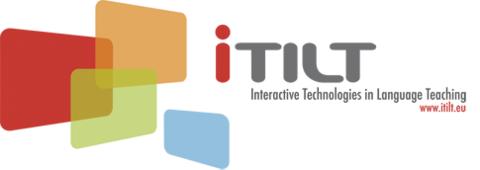
The iTILT-website www.itilt.eu had 18,545 visits of 10,721 unique visitors and 42.3% returning visitors up to the end of June. In the top seven all partner countries are represented: Belgium (3,343 visitors), France (2,607 visitors), Spain (1,556 visitors), UK (1,516 visitors), Netherlands (1,428 visitors), Germany (1,385 visitors), Turkey (898 visitors).
Dissemination activities have resulted in 122 blogpost, 6 newsletters, a FaceBook page with 404 likes, a Twitter account following over 542 people, with 282 followers, regular discussions launched via our LinkedIn-group (with 727 subscribers), 461 listeners of our 20 podcasts in EN, FR, NL, DE, a curation site on Scoop.it with over 2300 views and 1520 visitors and contributions to online discussions about IWBs in language learning forums such as the IATEFL LT SIG. 256 iTILT training manuals (colour-copy) and 400 usb-sticks with the iTILT-materials on it have been produced to be distributed amongst stakeholders.
More details about the iTILT social media:
- Facebook. Our page now has 404 likes and serves as a way of alerting language teachers using IWBs to our activities.https://www.facebook.com/iTILTeu?sk=wall
12 posts, 400 likes, 155,089 friends of fans, 150 average total weekly reach - In addtion to partner Twitter accounts the project’s account started building a following (currently our followers stand at over 542 people, with 282 following us); 169 tweets related to #iTILTeu were sent by the different partners. https://twitter.com/ITiLTeu
Following 542, 282 followers, added to 17 Twitter lists - Linkedin that has had a number of active discussions (727 subscribers): http://www.linkedin.com/groups/ITiLT-Interactive-Technologies-in-Language-3742871
727 members - podcast in English, French, Dutch and German with 461 listeners (http://www.scoop.it/t/iwbs-language-teaching)
19 podcasts with 463 listeners - ‘curation tool’ using Scoop.it, called IWBs and language Teaching, which has over 2300 views and 1520 visitors http://www.scoop.it/t/iwbs-language-teaching
2300 views, 1520 visitors, 118 followers, 228 reactions to posts - You tube channel with our iTILT-tutorials http://www.youtube.com/user/iTILTeu?feature=watch
Statistics show that iTILT’s crown jewels, the database with video clips of classroom practice, have been watched over 6,906 times (2/2/2012-11/6/201) and that the teaching material on Promethean Planet and Klascement.be has been viewed 3,730 times and was downloaded 60 times in 2,5 months’ time.

At least 5,800 dissemination partners and contacts have been reached through our six newsletters on the project progress.
The whole team gave over 40 presentations at local and workshops and (inter)national conferences and reaching at least 2.595 language teachers. In total we have disseminated iTILT to over 27,715 people!
The team contributed with seven articles to the book Interactive Whiteboards and Language Teacher Professional Development to be published by Continuum. The book is part of a book series on ”Advances in Digital Language Learning and Teaching”, which is edited by Michael Thomas, Mark Warschauer and Mark Peterson and aimed for teacher trainers and postgraduates. These articles are based on data and findings of the iTILT-project.
Research papers
In addition to over 40 presentations by the partners academic publications include 7 research papers to date, published or due to be published soon:
Whyte, S., Cutrim Schmid, E., & van Hazebrouck, S. (2011). Designing IWB Resources for Language Teaching: the iTILT Project.International Conference on ICT for Language Learning, 4th Edition.
Koenraad, A.L.M. (2012). Towards Effective Use of Interactive Whiteboards in the Modern Language Classroom. In: Alicja Wujec Kaczmarek (ed.) Technologie informacyjne i komunikacyjne w nowoczesnej edukacji – z perspektywy polskiej i europejskiej. Opole: MODN (Information and Communication Technologies in Modern Education – From Polish and European Perspective).
Whyte, S., Beauchamp, G., & Hillier, E. (2012). Perceptions of the IWB for second language teaching and learning: the iTILT project. In L. Bradley & S. Thouësny (Eds.), CALL: Using, Learning, Knowing, EUROCALL Conference, Gothenburg, Sweden, 22-25 August 2012, Proceedings (pp. 320-6).
Whyte, S. (2012). Developing and integrating teacher competences in language acquisition, pedagogy and technology. In Causa, M., Galligani, S., & Vlad, M. (Eds.). Formation et professionalisation des enseignants de langues : Evolution de contextes, des besoins et des dispositifs. DILTEC, Université de Sorbonne Nouvelle-Paris 3. pp. 220-31.
Cutrim Schmid, E. & Whyte, S. (2012). Interactive Whiteboards in School Settings: Teacher Responses to Socio-constructivist Hegemonies. Language Learning and Technology 16 (2), 65-86.
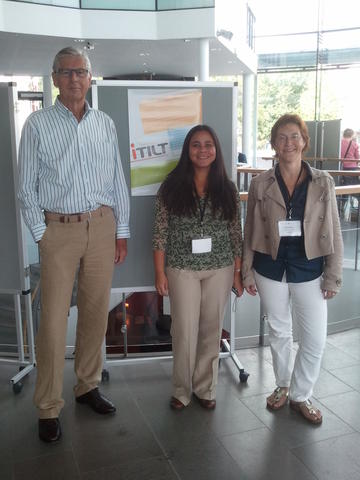
Hillier, E., Beauchamp, G. and Whyte, S. (2013) ‘A study of self-efficacy in the use of interactive whiteboards across educational settings: a European perspective from the iTILT project.’ Educational Future, 5 (2), pp. 3-23.
Whyte, S., Cutrim Schmid, E., van Hazebrouck, S., & Oberhofer, M. (in press). Open educational resources for CALL teacher education: the iTILT interactive whiteboard project.
So alas, it is Exit iTILT, it was a labour intensive but gratifying project. We were a truly great team, not in the least thanks to the dedicated, inspiring and effective leadership of our coordinator, Margret Oberhofer (LinguaPolis, Anwerp University).
But there is also good news: there are plans to define a follow-up project: after all never change a winning team.
And for me personally, never a dull moment – enter the TABULA ALBA project. TELLConsult accepted the invitation to be responsble for the IWB training component in the Comenius Regional Partnerships Project ‘Tabular Alba’ and joined the application which just got accepted: Project 2013-1-TR1-COM13-48781 is expected to start in September 2013 and will last for two years. It is an initiative of a Polish and a Turkish region collaborating on local professional development in the Educational ICT domain with a special focus on IWB implementation. More info in this blogpost.
Aveiro edition of iTILT summer course cancelled due to unexpected closing of all University buildings
Submitted by tonk on Mon, 06/03/2013 – 22:27
Regrettably we had to cancel the Aveiro edition of the Comenius summercourse ‘Using Interactive Whitebords in Language Education’ offered by the EU project iTILT.
Last week we were informed by Prof. António Moreira, director of the Faculty of Education, that ‘ […] the University Dean decided to completely close the University from 5th to 16th August… ‘

This measure was apparently taken to reduce local expenses in reaction to budget cuts due to the (inter)national crisis.
Having explored alternative solutions (same week but in other location in Aveiro, different week at the University) we concluded that the best option we could offer pre-registered applicants was attendance at the edition of the same course we run in Valencia in week 29 (July 15 – 19, 2013). The more since this course had already been confirmed.
When consulted Mrs Dayus-Brouwer, the coordinator of the LifeLongLearning Programme at the Dutch National Agency (EPF), who originally approved this course, informed us that she fully supports this alternative recognising that TELLConsult, as course organiser, was confronted with conditions that are beyond its control.
All involved were informed about these changes and were sent documents that could be required when requesting National Agencies permission to spend the grant on attending the Valencia version of the course.
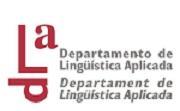
TELLConsult’s latest conference contributions and EU project dissemination activities
Submitted by tonk
on Sat, 05/18/2013 – 22:20
On behalf of TELLConsult Ton Koenraad has been very active in the first half of 2013 disseminating (interim) results of the projects his consultancy is involved in. See his activities listed below:
- We presented the paper ‘NL approaches and instruments to promote integration of ICT in (teacher) education’ at the ISNITE 2013 Conference in Ankara, Turkey.
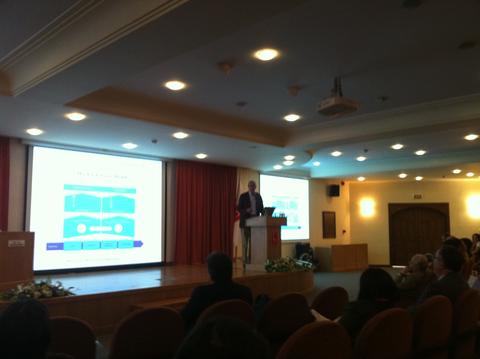
Haceteppe University students volunteered to make the conference organisation to a success. As this pic – taken after the conference dinner- testifies time and energy was spent on making guests feel welcome!
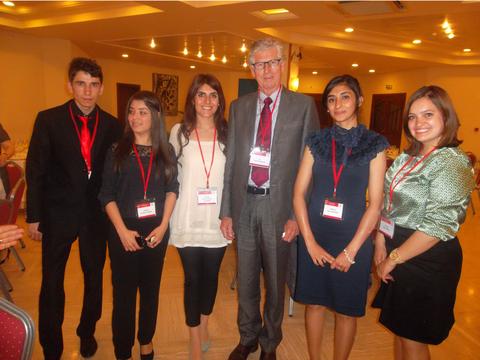
At the same conference we – together with iTILT’s Turkish partner- also presented the iTILT and SmartVET projects and their (interim) results. See PPT here.
- We were also Invited by Nevsehir university Faculty of Education in Turkey to present TELLConsult’s experiences with Technology & Language Teacher Education and the results of the EU projects iTILT and SMARTVET as reported at the ISNITE 2013 Symposium in Ankara. The picture shows the Dean thanking me and handing me a terra cotta plate memorizing the founding of this fast growing University.
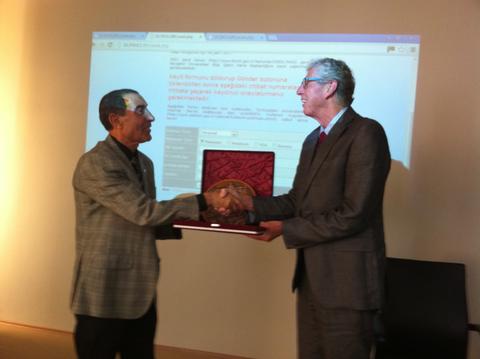
- A full paper on student roles in 3D virtual worlds & language education was presented at the SITE 2013 conference in New Orleans. This included dissemination of the interim results of the EU project EUROVERSITY.

- We contributed another presentation of the EU project iTILT on Interactive Whiteboards in Language Education at a national level as invited workshop to the bi-annual national congress of NL German teachers in 2013. PPT available here
- At the beginning of the year we were invited to present the EU iTILT project results in the SMARTboard visitors’ room at the BETT show 2013
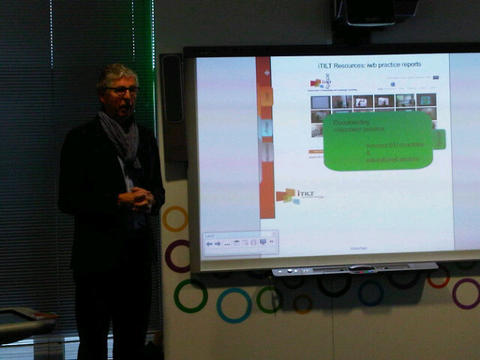
TELLConsult contributed to EU project proposal on machinima in language education
Submitted by tonk on Thu, 02/28/2013 – 12:58
TELLConsult was invited by a consortium of Universities and SMEs led by the University of Central Lancashire (Michael Thomas) to join an EU project proposal to produce a set of model machinima to illustrate their application in language education.
The main aims of the project are:
CAMELOT aims to create and test m a c h i n i m a that are designed to promote language learning, intercultural exchange and digital literacy skills among the participants.

CAMELOT will store the m a c h i n i m a in open access repositories enabling language learners, instructors and teacher trainers to use, reuse and share them during the lifecyle of the project as well as in a sustainable way following its formal completion. Along with the language-related m a c h i n i m a , there will be guidelines about how to create them in immersive environments.
CAMELOT will create an online community of practice around the m a c h i n i m a promoting their benefits among a broad cross-section of educational sectors and disseminate good practice via a range of academic and practitioner venues including conferences, workshops and symposia.
CAMELOT will impact national policies in the area of language learning, intercultural communication, and digital literacy skills, raising awareness of creative and flexible forms of learning and the potential of immersive virtual environments to promote telecollaboration and networking between educators across the EU.
The video recordings aim to promote intercultural communication and opportunities for learners from different cultures to co-produce digital artefacts that can be shared and reused. Stimulating rich and meaningful intercultural exchanges among language learners in the EU is one consequence of the networks CAMELOT will establish.
TELLConsult will lead the Work Package Exploitation and contribute to the dissemination of the project progress and results and by coaching the piloting process at an associate partner school in the Netherlands.
By way of preparation and to be in a better position to contribute to the project definition I participated in the 5-week 2013 MachinEVO workshop and worked on a machinima as introduction/tutorial for the Comics Puzzler, the 3D communicative game I designed for the NIFLAR project (see photo above). Thanks to help, time and effort from Christel Schneider (CSi-Train) and Carol Rainbow we got a most interesting result, check it out here.
TELLConsult involved in Comenius Regio project application ‘TABULA ALBA’
Submitted by tonk on Sun, 02/24/2013 – 13:26
TELLConsult got invited to organise four course weeks in the period 2013-2015 in the train-the-trainer programme planned for the project ‘Tabula Alba’.
A Polish and a Turkish regio decided to collaborate in an application of a Comenius project targeted at continuing professional development of staff of a number of local schools in the field of ICT and IWB in particular.
One of the arguments for this initiative runs as follows:
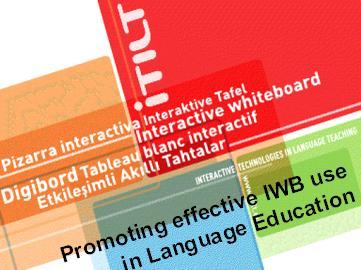
‘According to the report of Euridice ‘Key Data on Learning and Innovation through ICT at School in Europe 2011’ both Poland and Turkey do not apply modern technological developments in education in sufficient degree. The project Tabula Abla gives a chance to Polish and Turkish teachers and students to study the technological solutions applied in IWB, makes available ’know-how’ worked out in European projects (eg. Interactive Technologies in Language Teaching ) and other European educational institutions and enables to set up a common website where the materials will be published and the cooperation will be continued. The most important elements are the possibility of making the good, verified resources and solutions available to the teachers and the chance to meet the best European specialists in ICT in education. The other advantage is the increased possibility to engage higher number of teachers in the training and to disseminate of the project results among the teachers.’
As TELLConsult we feel honoured to have been invited to support this project the more so since -in our opinion – it is also a tribute to the results and dissemination efforts of and courses offered by the iTILT project.
Also my contribution to the Opole University occasional monograph may have helped:
Koenraad, A.L.M., (2012). Towards Effective Use of Interactive Whiteboards in the Modern Language Classroom. In Alicja Wujec Kaczmarek (ed.) Technologie informacyjne i komunikacyjne w nowoczesnej edukacji – z perspektywy polskiej i europejskiej. Opole: MODN
My day at BETT
Submitted by tonk on Fri, 02/15/2013 – 15:59

Recently attended the BETT conference, my first time ever, and was impressed at the sheer size and the variety of presentations and products on show. Main reason for going was to support Margret Oberhofer, the coordinator of the EU project iTILT, presenting results at the SMARTboard reception and workshop room. For more info and pics see the bloglpost at the iTILT site. Our presentation was also blogged about by Angela Higgins, one of my SMARTVET partners.
I used the rest of the day to get an impression of the state of the art in educational technology land. Considering the huge number of stands and workshops that was quite a challenge, both mentally and physically. Here’s a small selection of items that caught my attention, most related to ICT and language education (CALL).
Audio Notetaker
‘Audio Notetaker recording software allows users to edit and navigate audio like a text document making it the perfect tool for note taking, speaking and listening skills, training and SEN’. I had a personal demo and was impressed by the user friendliness of the interface, in particular of the editor. More info on their website.
Moodle-based VLEs
Also picked up flyers form parties that developed proprietary VLEs built on Moodle including WebAnywere and ToTara
Some interesting Apps
IntoWords provides support for reading and writing by providing vocab, audio support and word prediction. Another computer software tool for bimodal content presentation of websites and documents is ReadSpeaker. The product is Dutch and its rationale is is well documented by research, I found out later in the brochure. Text-to-Speech technology is als applied in WordQ+SpeakQ, claiming to promote writing skills.
Appsheds provides tutorials and intuitive and flexible tools for building content based web apps yourself.
Further observations:
It was a bit of a surprise to find that touchscreens have not taken over the attention for IWB technology yet. Also I was not aware that there are so many brands still competing for a share of the market.
On the other hand – to further enhance options to stimulate interactivity- an increasing number of parties are offering integral systems connecting (user) tablets or classroom desk computer stations to a central screen, e.g. AviTice School Integral .
Finally, good to see the Skype in the classroom initiative has grown into an established community.
Free course in 3D on English medium teaching
Submitted by tonk on Thu, 01/03/2013 – 13:08
The course 1EN124 Teaching in English, taught entirely in a 3D learning environment in Second Life, aims to give university teachers (and people in similar situations) advice about and practice with teaching their subject in English.
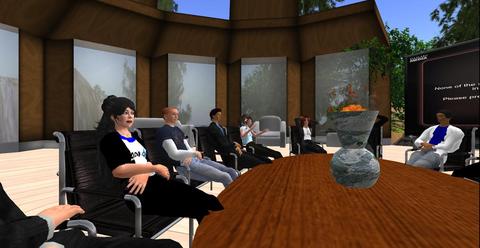
There will be two sorts of instruction:
practical sessions (where participants carry out different aspects of teaching and receive feedback on their performance) and theory sessions (where participants discuss some of the issues involved in teaching their subject in English).
P.S. When interested in (language) teaching in 3D in general consider participating in this EU-funded course and/or join the EU network EUROVERSITY
EU Grants for language teachers
Submitted by tonk on Sat, 12/22/2012 – 18:55
The Universities of Antwerp, Coimbra and their partners in the EU projects iTILT and NIFLAR are offering EU-funded summercourses in 2013 targeted at teachers of modern languages on:
a) effective use of Interactive Whiteboards

and
b) ICT & WEB 2.0 applications to promote oral competences, respectively.
TELLConsult, co-initiator and partner in both projects, is organising these courses in collaboration with the University of Aveiro and the Technical University of Valencia.
Find more information on the course descriptions at the EU Comenius/Grundtvig Training database, the related grants and the course registration from here:
http://www.koenraad.info/content/current-courses
N.B. Those interested in applying for an EU grant are advised to start working on the application as the deadline for submitting completed forms (including a course (pre-) registration testimonial and employer signature) is January 16, 2013.
TELLConsult hosted SMARTVET project meeting in Utrecht
Submitted by tonk on Fri, 11/09/2012 – 22:56
As partner in the EU project SMARTVET on Interactive Whiteboards (IWB) in (Irish) vocational Education TELLConsult hosted the project’s 3rd meeting in Utrecht.
On the basis of supplied information on its interesting architecture, IWB abundance and my personal former work location, the Faculty of Education of Hogechool Utrecht University of Applied Sciences (8.000 students) at the Utrecht Campus was selected as preferred meeting place.
All partners from UK, Ireland and Italy were present. Progress and results were reviewed and further steps planned. Also tools for dissemination such as the logo proposals
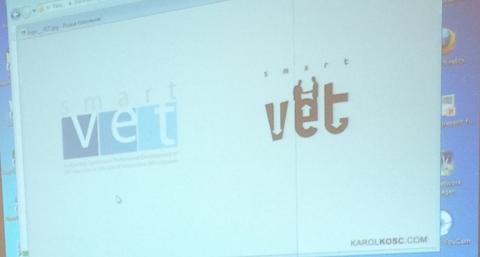
and the Community site were discussed and adapted.
With a guided quiz tour in Utrecht City and a dinner in the lounge of a former Protestant club (Polmans Huis), adequate attention was paid to the cultural component of international project meetings, as promoted by the EU.
|
|
|
Finally, after preparations for the interim report had been made and dates were chosen for the next meeting (Triest) and the final conference (Dublin, 2013), participants were shown around the Faculty building and premises
|
|
|
|
Partners reported to be pleased with the meeting’s results, accomodation and meeting facilities. Some also expressed their amazement -even shock at first – about the amount of bikes in the streets and the riding behaviour of some of their owners.
TELLConsult invited to join advisory panel for EU project on games & language learning
Submitted by tonk on Sat, 11/03/2012 – 22:05
As member of the advisory panel of the European (Lifelong Learning Programme) project GOBL (Games Online for Basic Language learning, 2012-2014) ) I recently attended a f2f meeting at the Kortrijk location of Leuven University to discuss one of the project’s first deliverables: the needs analysis report.
As a follow-up Frederik Cornillie, hosting the Kortrijk session, Skype-interviewed me to discuss additional issues and summarize my main comments.
The GOBL project is an initiative of partners at Radboud University Nijmegen, KU Leuven Kulak, Newcastle University and the Council for Scientific and Industrial Research in South Africa.
It aims to design, develop and evaluate a demonstrator/proof-of-concept for a web-based mini-game environment for lowly-proficient learners for the learning of basic knowledge and skills (grammar, lexicon and pronunciation) in French, Dutch and English as second or foreign languages. The project takes a user-centred and iterative approach, in which mini-game concepts are being designed and evaluated with target learners (and teachers) in the UK, the Netherlands, and in Belgium.
Valencia edition of NIFLAR summercourse 2012 well attended
Submitted by tonk on Wed, 10/31/2012 – 22:19
TELLConsult chaired the Comenius course sessions on MFL speaking competences & Technology.

The course, one of the results of the EU project NIFLAR, is a 5-day, international course on methodologies for new technologies in computer assisted language learning (CALL). It is an initiative of a partnership consisting of Utrecht University in collaboration with Valencia University, TELLConsult and the Utrecht Summer School. It had two editions, one in Utrecht in July (see report here)
and one in Valencia in Spain inOctober 2012

.
Find the course description here, at the Comenius/Gruntvig page.
With a total of 28 international participants, mostly language teachers with practices in primary and secondary education, it was well attended.
The Valencia team consisted of the Utrecht University researcher Silvia Canto and British Council consultant, Graham Stanley, at work in the pics below. The latter contributed a workshop on asynchronous communication.
|
|
|
Other team members were Nick Zwart (3DLes) , who presented Chatterdale, a virtual language village and gave a training on using Open Simulator. Finally, as ‘expert at a distance’ Heike Philip (Let’s talk online) presented on recent developments in online language learning and – as a follow-up – did an ‘inworld’ guided tour in Edunation Islands.
The partners involved are now considering the invitation by Utrecht Summer School to offer this successful course again in 2013.
Graham Davies remembered at EUROCALL 2012 conference
Submitted by tonk on Sun, 09/02/2012 – 13:44
Attended the 2012 EUROCALL conference late August, in Gothenburg, Sweden.
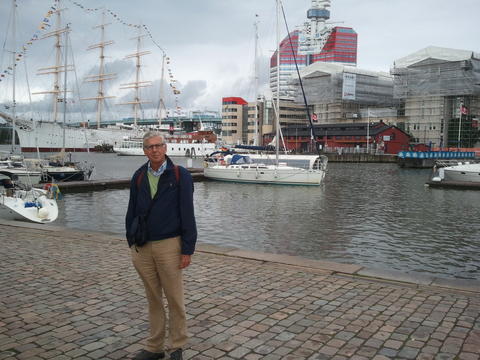
Representing TELLConsult as partner in a number of current and previous EU projects (iTILT, EUROVERSITY, NIFLAR) I did some project dissemination activities and promotion work for current (NIFLAR) and future (iTILT) Comenius courses I am coordinating.
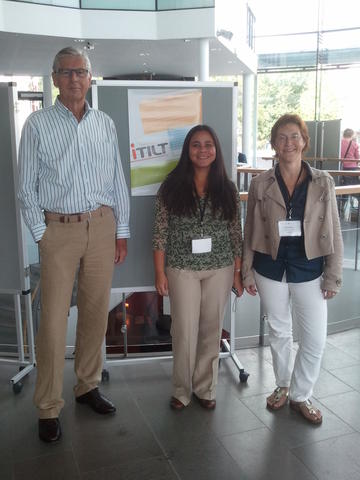
More info about the 2012 courses on MFL speaking competences & Technology here.
Not having submitted a paper myself this time I could also concentrate better on the sessions I selected (see my #eurocall tweets here). Among them, of course, the presentations on Interactive whiteboards in Language Education by my projectpartners Euline Cutrim Schmid (Heidelberg University of Education) and Shone White (Nice University). For more info on their papers see this blogpost at the iTILT site.
After an extra day for sightseeing I returned, pleased with the input and happy about the yearly encounter with so many EUROCALL colleagues and friends. E.g. on the right with Mirjam Hauck.
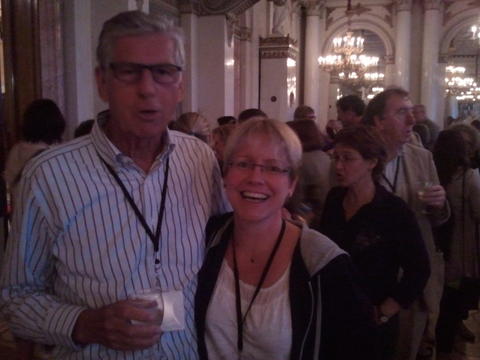
Also a special mention here of Piet Desmet as it was such a long time no see. And because he brought quite a few University of Leuven/KULAK project team members I got acquainted with over the years and with whom I will be collaborating with soon as consultant in the GOBL project on mini-games for language learning.
In addition to the formal Graham Davies remembrance moment during the plenary opening there were also several moments during the conference that elicited personal memories of activities I shared with my old time colleague and friend.
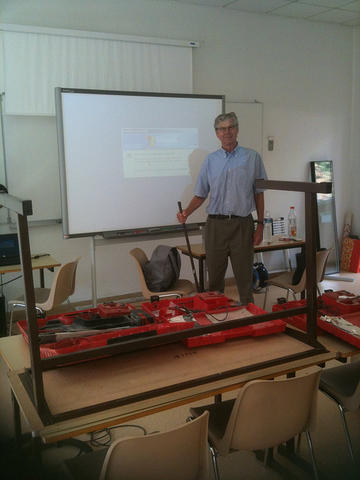
For instance the moment in Bordeaux (2010) when we both were inspecting the rooms for our pre-conference workshop and he offered to document my moment of confrontation with the ‘under construction’-state of my IWB workshop setting.
Or, a year later in Nottingham, attending a workshop on 3D worlds, our common interest,

and here, below, sharing a dinnertable at that same EUROCALL conference (2011)

It is only a year ago that I had the pleasure of interviewing him and other international MFL experts for a symposium about the future of language education as part of the first centennial of the Dutch national Association of Language Teachers ‘Levende Talen’.
View and/or listen to his comments on developments related to interactive and mobile technologies in the audio-enhanced version of my publication: Koenraad, A.L.M. (2014b). Expert Views on How Language Education May Develop in the Next 20 Years and What CALL Could Contribute. The EuroCALL Review Volume 21, no 1, March 2014. .
As a tribute to him and his impressive contribution to CALL I offered the EUROCALL Executive Board to help out with finding solutions to keep the ICT4LT site accessible and up to date.
Some places available for EU-sponsored course on MFL speaking competences & Technology
Submitted by tonk on Thu, 08/16/2012 – 14:22
The interest in the international course ‘Methodologies and Technologies to promote oral communication in Language Education ‘ warrants another run in 2012. This time the event will take place in Valencia, Spain, the second week of October (week 42). Check this page for details, download the day-to-day program and/ or register here.
Pre-booked rooms and/or recommendations for suitable Hotel accomodation of 50 Euro p/d and less will be made available to course applicants.
This 5-day course, one of the exploitation activities of the EU project ‘NIFLAR‘ (Networked Interaction in Foreign Language and Research), is an initiative of TELLConsult in cooperation with two other, former NIFLAR partners, the Universities of Utrecht and Valencia. These parties currently also collaborate in the EU network project EUROVERSITY .
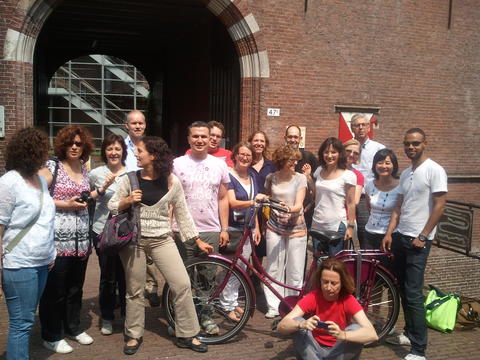
The first edition of this international course was successfully run as a Utrecht Summer School course in early July 2012 (week 27) in Utrecht, the Netherlands. See this blogpost for a brief impression.
Great evaluation results for Utrecht summer course on MFL speaking competences & Technology
Submitted by tonk on Sun, 07/08/2012 – 23:23
The Utrecht session of the Comenius course on MFL speaking competences & Technology took place in in the first week of July.

The course, one of the results of the EU project NIFLAR, is a 5-day, international course on methodologies for new technologies in computer assisted language learning (CALL). It is an initiative of a partnership consisting of Utrecht University in collaboration with Valencia University, TELLConsult and the Utrecht Summer School.
TELLConsult was invited to chair both the Utrecht and the Valencia session, taking place In October 2012 in Spain.
With 15 international participants, mostly language teachers with practices in primary and secondary education, it was well attended.
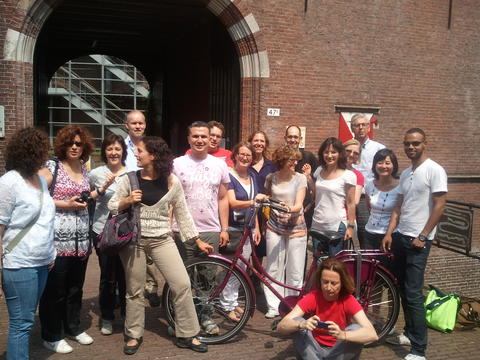
Topics included both asynchronous and synchronous forms of and tools for Computer Mediated Communication (CMC) such as Vocaroo & Video Web Conferencing and Second Life & Open Sim as language learning environments. Special attention was paid to the theoretical underpinnings of Task Based Language Learning and Teaching with a focus on the task design grid as developed in the NIFLAR project.
On the final day a number of resources and strategies were suggested that participants could use to support their further professional development. Find the full day-to-day programme on the course page.
In addition to the Utrecht University Prof. Rick de Graaff and researcher Silvia Canto, at work in their respective workshops in the pics below
|
|
|
Nick Zwart (3DLes) and Joe Dale (Integrating ICT into the MFL classroom) were part of the team as invited lecturers. The latter contributed a workshop on asynchronous communication.See the picture on the right below where Joe is coaching participants in familiarizing themselves with a number of Web 2.0 applications.
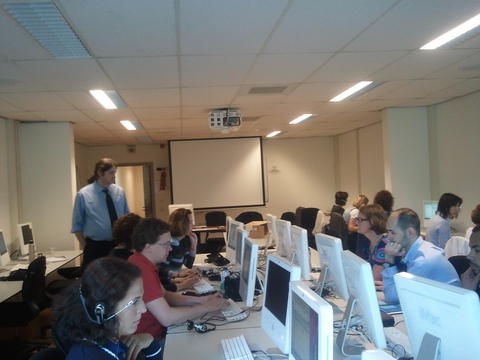
As a demonstration of the ‘expert at a distance’ format for videowebconferencing Heike Philip (Let’s talk online) was kind enough to present on recent developments in online language learning and – as a follow-up – showed participants around ‘inworld’ on Edunation Islands.
Both the formal evaluation results and the informal Tweets show that the course contents and social programme were most positively appreciated by the participants. Find some Twitter messages and pics of excerpts of the evaluation survey below to support this conclusion. Also some valuable suggestions for improvement were made, e.g. to make more time available to explore applications and develop materials.
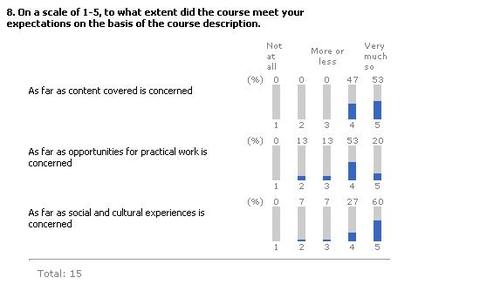

EU projects iTILT and SMARTVET proposed joint presentation at Educa Berlin
Submitted by tonk on Sat, 06/02/2012 – 09:53
Being involved in four EU projects dealing with interactive classroom technologies in various capacities (full, subcontracted and dissemination partner) TELLConsult took the iniitiative to try and join forces to contribute collectively to the Educa Online 2012 conference.

Despite time constraints the iTILT and SMARTVET projects managed to co-author and submit a workshop proposal on the deadline, June 1. Find the abstract below.
Abstract pre-conference workshop
Although the use of interactive whiteboards (IWB) is becoming increasingly commonplace in mainstream education in many of the more affluent parts of the world, relevant research literature overviews (Kennewell, 2006; Higgins et al., 2007; Koenraad, 2008) ) point to limitations in the uptake of this classroom technology in specific disciplines and educational sectors and the realisation of added educational value in general.
The fact that these studies identified teacher training (approach, contents and modes of delivery) as an important factor related to these issues also motivated a number of European project initiatives. In this seminar, two of these European initiatives (iTILT and SMARTVET), will shed their light on different training approaches that all strive to make training relevant for teachers from different educational sectors.
The training practices discussed include a) online training (through more than 140 IWB practice reports from six European countries, some 30 instructional clips and the provision of additional resources), b) paper-based training in the form of handbooks with realistic examples and c) a blended learning component.
In order to guarantee relevant results, both projects have based the designs of these training models on a needs analysis, using partly identical research instruments including respondents-generated input, and on up-to-date findings from IWB specific and general professional development research.
Flexibility realised by the modular and blended learning design and the focus on competency development necessary for exploiting the IWB in ways consistent with current pedagogies for specific subject teaching in specific contexts rather than a technological perspective all contribute to the innovative character of the approach.
The two European projects, funded within the Lifelong Learning Programme of the European Commission, are:
a) iTILT – ‘Interactive Technologies in Language Teaching’ (2011-2013).
iTILT focuses on foreign language teachers from primary school to higher education. The website www.itilt.eu will provide them with over 140 multimedia IWB practice reports, containing examples of IWB-activities from foreign language classrooms from six European countries. These examples also include relevant feedback from teachers and learners and related teaching materials. The aim of the IWB practice reports is to support teachers in developing the necessary competencies for exploiting the IWB in ways consistent with current theories of language teaching pedagogy.
b) SMARTVET – ‘Supporting Continuous Professional Development of VET teachers in the use of Interactive Whiteboards’ (2011-2013).
SMARTVET addresses issues related to the IWB competence levels of (Irish) teachers in the vocational education and training (VET) sector. The project is developing materials to support a train-the-trainers approach based on the results of local needs analysis research and good practice as identified in international IWB training contexts and initiatives.
References:
Higgins, S, Beauchamp, G and Miller, D (2007). Reviewing the literature on interactive whiteboards. Learning, Media and Technology, Vol 32 No 3 pp 213-35.
Kennewell, S. (2006). Reflections on the interactive whiteboard phenomenon: a synthesis of research from the UK. http://www.aare.edu.au/06pap/ken06138.pdf
Koenraad, A.L.M. (2008). Interactive Whiteboards in educational practice: the research literature reviewed. http://www.koenraad.info/sites/koenraad.drupalgardens.com/files/LitReviewstudyIWB_Koenraad2008_final_tellc_0.pdf
Draft version of needs analysis report re IWB training presented at SMARTVET project meeting
Submitted by tonk on Fri, 05/25/2012 – 19:21

Community College Norwich (CCN) in the UK hosted the second project meeting of the SMART_VET project.
Progress was reviewed and part of that agenda concerned the scrutiny of the draft report of the needs analysis carried out by TELLConsult. See the brief draft summary below. A final version will be available soon after partner and focus group feedback has been processed.
We also defined the agenda for the next period, including the next meeting, this time in Utrecht, Holland: so my turn to host the session.
To round off our visit we were shown around the CCN premises where several implementations of educational concepts and developments were introduced including the start up lounge 2 promote enterpreneurship as part of the curriculum in vocational education.
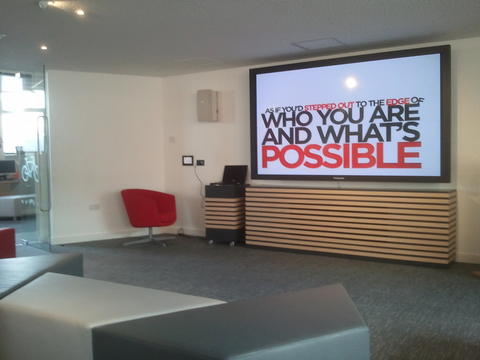
The theme of the ‘pitch’ activity’ that was going on at the very moment we were there happened to be modern languages.
So I really needed to have the picture below of an advert of a prospect Language School owner:
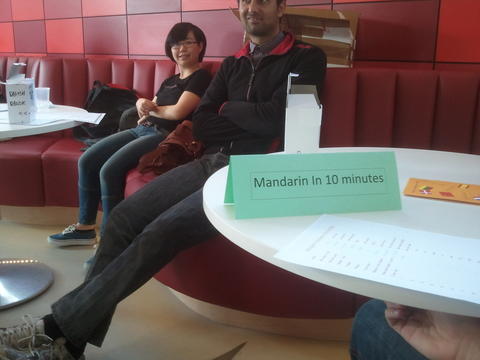
As a follow up project partners were also invited to attend the 2012 EFODL conference: ICE AGE
Summary of SMART_VET Needs Analysis Report.
As part of the EU project ‘Supporting Continuous Professional Development of VET teachers in the use of Interactive Whiteboards’ the present study reports the results of a needs analysis.
This research aims to provide information to optimize the alignment of the design and delivery of training materials to foster the use of IWBs in the delivery of the professional development programmes for VET teachers in Ireland.
With the help of an online questionnaire distributed among Ireland-based teachers data were collected in March 2012 to establish the IWB & general ICT competencies, availability and levels of IWB use.
Aspects involved were teachers’ confidence levels for and actual use general ICT applications and of the various IWB functionalities and their beliefs about its educational potential.
Measures taken to optimize the representativeness of the resulting response set with respnses from a third of the County Wicklow educational VET community haven turned out to be successful.
The main findings resulting from the analysis of this data, reflected on by the SMART-VET project team and a local focus group are that:
- in general the teachers involved are quite willing to approach IWB competence development as an issue that needs to be addressed and many of them report their motivation to become more competent in IWB use.
- although respondents report to be reasonably confident about their personal and professional ICT skills there is an interest in further competence development on how to integrate IT in teaching and in applications relevant for and with IWBs
- most respondents appear to opt for a face-to-face & blended approach to professional development preferably in small groups allowing hands-on activities and collaborative learning with peers with time and opportunities to pilot subject specific materials in actual practice.
The fact that this research has shown that the majority of the respondents a) do not use the IWB b) are interested in using it in their teaching and c) would welcome training is seen as supporting the rationale for the SMART_VET project.
Analysis of questionnaire data for SMART_VET project
Submitted by tonk, on Sun, 04/01/2012 – 00:34
One of the objectives in the EU project ‘Supporting Continuous Professional Development of VET teachers in the use of Interactive Whiteboards’ (SMART_VET, 2011-2013) is to undertake needs analysis of VET teachers as input for the development of IWB training materials.

TELLConsult was subcontracted to carry out this research. To this end an online questionnaire was developed earlier this year.
Reaching what we expect to be a representative response result (n= 200) we closed the questionnaire on March 20. An extension of the data collection period with 14 days was needed to get to this number.
Data will be analysed the coming days and a draft version of the report will be presented for feedback to the team next week.
TELLConsult invited by Anglia Network Europe to contribute to EU project initiative
- Submitted by tonk, on Wed, 02/29/2012 – 16:24
Anglia Network Europe initiated the development of an EU project proposal and successfully submitted the project description.

The project addresses the urgent necessity to adapt adult language learning methods to the real needs of adults language learners and the growing desire from education providers to integrate the promotion of active citizenship into their curriculum. In order to obtain both objectives this project aims to develop a method for intergenerational foreign language learning.
The aim is to develop a coherent, integrated method for foreign language learning for adults, involving pupils of secondary education, which is applicable in different European countries. The project idea is based upon small scale experiments with language training for elderly people executed by pupils in secondary education which turned out to be very successful for both the pupils and the elderly people.
An important drive for the development of this project was also the fact that the specific examination structure of the Anglia network which is applied in the partner countries, appears to be an important stimulus for people without any or very limited knowledge of the English language to start learning English. Finally the education partners in the network showed great interest in developing methods to integrate civic competences by means of voluntary work into the curriculum of secondary education.
In addition to research into the state of the art in adult foreign language education the concrete objectives include:
- The development of a method for adults aiming at foreign language learning in general and in English in particular, involving the active participation of pupils in secondary education, involving also the use of social media
- The execution of a pilot project in the partner countries
- The investigation of the possibilities of adding the ‘service-learning’ activities of the pupils into the formal curriculum.
TELLConsult was invited to participate in the application and contribute to a number of the research activities that have been planned.
TELLConsult visited schools in SA Swellendam area
- Submitted by tonk, on Mon, 02/06/2012 – 15:52
Thanks to introductions from Adriaan Mocke, Board director of the Olyfkrans College in Swellendam (see picture on the right here)
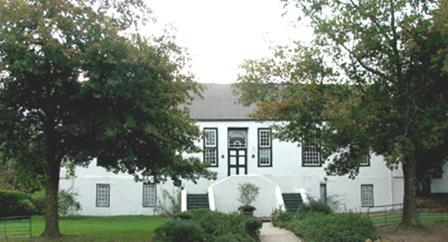
I could visit Hoërskool Swellendam and Swellendam Senior Sekondere Skool.
Representing the Anglia Europe Network and the English for Kids Foundation (EFKF) my mission was to explore project development opportunities for both these organisations.
At Swellendam secondary school I spoke to the principal, Mr. Adonis, and the head of the English Language Department, Ms James.
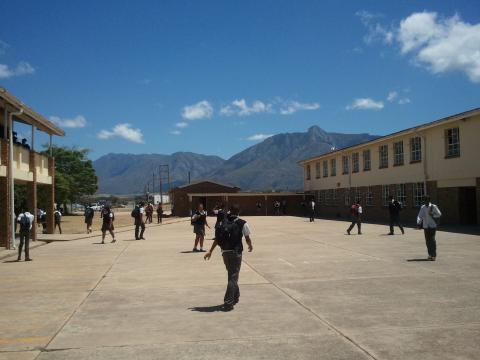
They were interested in both ventures and wanted to set up an EFKF-facilitated, pilot project to give selected pupils a chance to get the Anglia Certificates.
After being introduced to the Anglia Europe and English for Kids activities the principal and the English
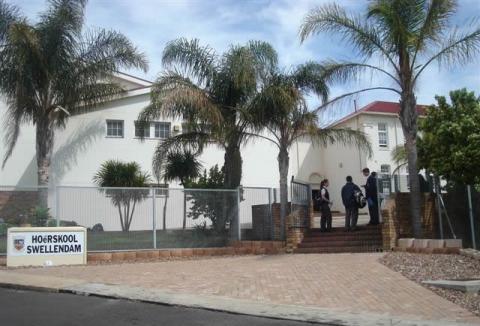
Language teacher at Hoërskool Swellendam opted to elaborate on the opportunities the Anglia Network offers to develop a telecollaborative project with one of the member schools.
When hearing about EFKF’s mission they suggested to introduce me to a teacher at a farm school in the neighbourhood as -in their view- this organisation stood a better chance to qualify for EFKF funding criteria.
So two days later I had a meeting with Pieter Man, who teaches English at the farm school ‘Slangeveer’, some 50 kms from Swellendam. I interviewed him to get an idea of the school’s (lack of) facilities and the living conditions of the pupils that attend it.
We also discussed possible ways EFKF could support the school and further conditions for learning English in particular.
It was arranged with all parties that I would first present the concept ideas discussed to the management of Anglia Europe and EFKF and would then report back and assist in further project development of those ideas for which their support is most feasible.
Finally, discussing my work/holiday activities with him I also got support from the host at the BloomEstate B&B resort we stayed at. He offered to help out locally if needed and could also introduce EFKF to the Railton Foundation in case the organisation would prefer to

support existing local initiatives rather than initiate one itself.
Koenraad.info Koenraad.info/Publications Koenraad.info/Blog Archive EUROCALL.NL TELLConsult.eu/projects


